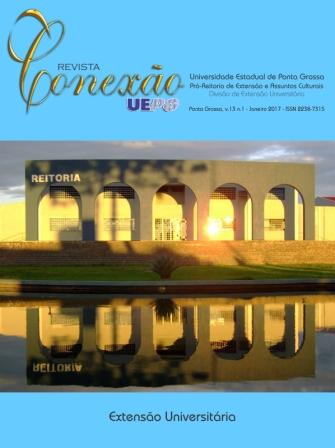CONTRIBUTIONS TO CARTOGRAPHIC LITERACY IN THE EARLY YEARS OF BASIC EDUCATION - DOI: 10.5212/Rev.Conexao.v.13.i1.0009
DOI:
https://doi.org/10.5212/Rev.Conexao.v.13.i1.0009Keywords:
cartographic literacy, early years, teaching and learning, geography.Abstract
The extension course “Contributions to Cartographic Literacy in the early years of basic education” comprised activities that were carried out inside and outside the Federal University of Ouro Preto (UFOP), with teachers working at that level of education in the municipal and state school system of Ouro Preto and Mariana, two cities in the state of Minas Gerais. This project was developed seeking to promote cartographic literacy to a public that does not have this knowledge and that might improve their awareness of the world through Geography classes. The main objective of this proposal, which is part of a university extension project, was to provide teachers and students with new methodological possibilities to teach and learn Geography through cartographic literacy. Three training meetings were held at the Teaching Practice Laboratory “Hebe Rola”/ICHS/UFOP, in 2016. The fourth and last meeting consisted of field work. Data demonstrated that cartographic notions can and should be worked from the early years of basic education, since they make it possible for the students to identify and interpret signs.
Downloads
References
ALMEIDA, L. C.; NOGUEIRA, R. E. Iniciando a alfabetização cartográfica. Extensivo – Revista Eletrônica de Extensão, UFSC, v. 6, n. 7, 2009.
ALMEIDA, R. D. Do desenho ao mapa. São Paulo: Contexto, 2006. 115p.
AUSUBEL, D. P.; NOVAK, J. D.; HANESIAN, H. Psicologia educacional. Rio de Janeiro: Interamericana, 1980.
BERTIN, M. O turismo em Foz do Iguaçu na visão dos estudantes: um estudo de percepção ambiental. 2003. 160 f. Dissertação (Mestrado em Geografia) – Setor de Ciências da Terra, Programa de Pós-Graduação em Geografia, Universidade Federal do Paraná, Curitiba, 2003.
CALLAI, H. C. A. Aprendendo a ler o mundo: a Geografia nos anos iniciais do ensino fundamental. Caderno Cedes, Campinas, v. 25, n. 66, p. 227-247, 2005.
CASTROGIOVANNI, A. C.; COSTELLA, R. Z. Brincar e cartografar com os diferentes mundos geográficos: a alfabetização espacial. Porto Alegre: Edipucrs, 2006.
KOZEL, S. Mapas mentais – uma forma de linguagem: perspectivas metodológicas. In: GIL FILHO, Sylvio F. et al. (Orgs.). Da percepção e cognição a representação: Reconstruções teóricas da geografia cultural e humanista. 1. ed. São Paulo: Terceira Margem, 2007.
OLIVEIRA, L. Estudo Metodológico e Cognitivo do Mapa. In: ALMEIDA, R. D. (Org.) Cartografia Escolar. São Paulo: Contexto, 2008.
PASSINI, E. Y. Alfabetização Cartográfica e o livro didático: uma análise crítica. Belo Horizonte: Editora Lê, 1994.
PAULO, J. R. Promovendo (re)significação de representações cartográficas no ensino de mapas: a constituição de uma parceria colaborativa com professores de geografia na educação básica. 2013. Tese (Doutorado em Educação) – Piracicaba, 2013.
SANTAELLA, L.; NÖTH, W. Imagem: Cognição, Semiótica, Mídia. São Paulo: Iluminuras, 2001.
TARDIF, Maurice. Saberes docentes e formação profissional. Petrópolis, RJ: Vozes, 2002.
VYGOTSKY, L. S. A formação social da mente. São Paulo: Martins Fontes, 1988.
Downloads
Published
Issue
Section
License
a) Authors retain copyright and grant the journal right of first publication with the work simultaneously licensed under a Creative Commons Attribution License that allows others to share the work with an acknowledgement of the work's authorship and initial publication in this journal.
b) By submitting an article to the Revista Conexão UEPG and having it approved, the authors agree to assign, without compensation, the following rights to the Journal: the rights of first publication and the rights to redistribute the article and its metadata to the indexing and reference services that the editors deem appropriate.
c) Readers are free to transfer, print out and use the articles published in the Journal, as long as there is always explicit mention to the author(s) and to the Revista Conexão UEPG and as long as there is no alteration of the original work. Any other use of the texts needs to be approved by the author(s) and by the Journal.






